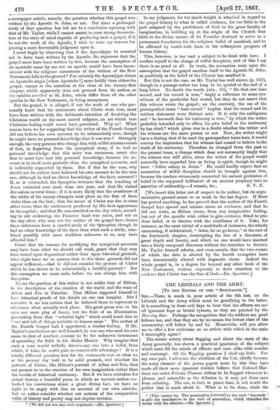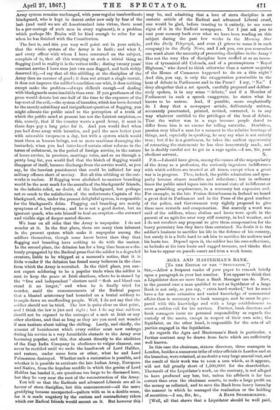THE LIBERALS AND THE ARMY.
[To THE EDITOR OF THE "SPECTATOR."] SIR,—There is much in your article of the 6th inst. on the Liberals and the Army which must be gratifying to the latter. It is something in these evil days to hear that the officers are not all ignorant fops or brutal tyrants, as they are painted by the Morning Star. Perhaps the recognition that the soldiers are good fellows too, and that they are by no means the lowest class of the community, will follow by and by. Meanwhile, will you allow me to offer a few criticisms on an article with which in the main I thoroughly agree ?
The recent outcry about flogging and about the state of the Army generally, has shown a practical ignorance of the subject which must fill the minds of officers and men alike with wonder and contempt. Of the togging question I shall say little. For my own part, I advocate the abolition of the Cat, chiefly because the noisy clamour of the penny papers must by this time have made all their more ignorant readers believe that Colonel Mar- tinet can order Private Thomas Atkins to be flogged whenever he pleases, and miserable as the delusion is, it may yet deter men from enlisting. The cat, in fact, in peace time, is not worth the pother that is made about it. What is to be done, while the * [This cannot be. The nominative (Exurbs) to the verb " knoweth " is also the nominative to the verb of attestation, which identifies the writer with the attester.—ED. Spectator.] Army system remains unchanged, with your regular insubordinate blackguard, who is kept in decent order now only by fear of the lash (and until we are all Americanized into virtue, there must be a per-centage of such men in every regiment), is a problem which perhaps Mr. Beales will be kind enough to solve for us when he has finished with the Constitution.
The fact is, and this you very well point out in your article, that the whole system of the Army is in fault ; and what I, and every officer with whom I have conversed on the subject, complain of is, that all this worrying at such a trivial thing as flogging (and in reality it is the veriest trifle ; during twenty years' constant service I have seen just two men flogged, and both richly deserved it),—I say that all this nibbling at the discipline of the Army does no manner of good ; it does not attract a single recruit, it does not improve the soldier's condition one whit, it does nothing except make the problem—always difficult enough—of dealing with blackguards more insoluble than ever. If you gentlemen of the press would devote but one-half of the time to the exposure of the tap-root of the evil,—the system of bounties, which has been devoted to the merely subsidiary and insignificant question of flogging, you
might educate the public mind to the perception of a truth of which the public mind at present has not the faintest suspicion,—
this, namely, that if the country wants a good Army, it must in these days pay a long price for it. And you would find when you had done away with bounties, and paid the men better (not with miserable twopeneea a day, but with a system which would treat them as human beings, not as mere machines damaging the barracks), when you had introduced certain other reforms in the terms of enlistment, in the period of foreign service, in the nature of home service, in pensions, marriage rules, and so on through a pretty long list, you would find that the blotch of flogging would disappear of itself, because discharge from the service would, as you say, be the heaviest punishment that could be inflicted for any military offence short of mutiny. But all this nibbling at the out- works is useless. If flogging were abolished to-morrow branding would be the next mark for the assaults of the blackguards' friends, to the infinite relief, no doubt, of the blackguard, but perhaps not so much to the satisfaction of the unfortunate Captain of the blackguard, who, under the present delightful system, is responsible for the blackguard's debts. Flogging and branding are merely symptoms of a bad system ; and he is not a good doctor, but an ignorant quack, who sets himself to heal an eruption—the outward and visible sign of deeper-seated disease.
We hear on all sides that the Army is unpopular. I do not wonder at it. In the first place, there are many vices inherent in the present system which make it unpopular among the soldiers themselves, though none know better than they that flogging and branding have nothing to do with the matter.
In the second place, the delusion has for a long time been so sedu- lously propagated by the Radical press that the soldier is a degraded creature, liable to be whipped at a moment's notice, that it is little wonder if the delusion has found many believers in the class from which the Army is recruited. In the third place, you can- not expect soldiering to be a popular trade when the soldier is sent to keep the peace at Irish elections, where he is stoned by the "free and independent" electors until "flesh and blood can stand it no longer," and when he is finally tried for murder, amid the announcements of the Radical papers that a bloated aristocracy had hounded on a brutal soldiery to trample down an unoffending people. Well, I do not say that the soldier should not be tried. The law is quite clear on that point, and I think the law is just and right ; but I do say that soldiers should not be exposed to the outrages of a mob at Irish or any other elections, and that so long as they are you need not wonder if men hesitate about taking the shilling. Lastly, and chiefly, the amount of banishment which every soldier must now undergo during his service is a very formidable obstacle to the Army ever becoming popular, and this, due almost directly to the abolition of the Mist India Company in obedience to vulgar clamour, can never be rectified until we undo the handiwork of Lord Halifax, and restore, under some form or other, what he and Lord Palmerston destroyed. Whether such a restoration is possible, and whether it is possible to extricate the late Indian Army, European and Native, from the hopeless muddle in which the genius of Lord
Halifax has landed it, are questions too large to be discussed here;
but they lie very near the root of the reconstruction of the Army. You tell us that the Radicals and advanced Liberals are all in favour of stern discipline, but this announcement--all the more gratifying because unexpected—palters with us in a double sense, for it is made nugatory by the curious and contradictory riders which our Radical friends would mount on it. But however thia
may be, and admitting that a love of stern discipline is an esoteric article of the Radical and advanced Liberal creed, one would be glad, before trusting to it entirely, to see some signs of it in the Radical newspapers. Yet I just ask you to cast your memory back over what we have been reading on this subject during the past few weeks in the Morning Star and the Daily Telegraph, and even (I grieve to name it in such company) in the Daily News, and I ask you, can you remember one word about the necessity of preserving discipline in the Army ? Hasaot the very idea of discipline been scoffed at as an inven- tion of tyrannical old Colonels, and of a presumptuous "Royal Highness," who dared to think otherwise than a narrow majority of the House of Commons happened to do on a thin night And this, you say, is only the exaggeration permissible in the heat of debate in Parliament and in the Press? I say, "No." I deny altogether that a set speech, carefully prepared and deliber- ately spoken, is in any sense "debate," and if a Member of Parliament in such a speech exaggerate, he states what he knows to be untrue. And, if possible, more emphatically do I deny that a newspaper article, deliberately written, accurately punctuated, printed, revised, corrected, is in any way whatever entitled to the privileges of the heat of debate. That the writer was in a rage because people dared to differ from him is no excuse for telling untruths. Doubtless, passion may blind a luau for a moment to the relative bearings of things, and, especially in speaking, he may say what is not strictly true ; but if he is a gentleman, he takes the earliest opportunity of retracting the statements he has thus inaccurately made, and he is doubly careful not to get in a rage again.—I am, Sir, your
obedient servant, X.
P.S.—I should have given, among the causes of the unpopularity of the Army as a profession, the curiously ingenious indifference with which soldiers are treated at all times, except when a great war is in progress. Then, indeed, the public admiration and sym- pathy become almost maudlin and ridiculous ; but in ordinary times the public mind lapses into its normal state of indifferent or even grumbling acquiescence, in a necessary but expensive evil. For example, in the late Fenian disturbances in Ireland we heard a great deal in Parliament and in the Press of the good conduct of the police, and Government very rightly proposed to give these men rewards and compensation. But scarcely a word was said of the soldiers, whose clothes and boots were spoilt in the pursuit of an agile foe over very stiff country, iu bad weather, and I do not recollect any proposal to give them compensation for the heavy pecuniary loss they have thus sustained. No doubt it is the soldier's business to sacrifice his life in the defence of his country, but surely it is a little hard to ask him to sacrifice his uniform and his boots too. Depend upon it, the soldier has his own reflections, as he looks at his torn boots and ragged trousers, and thinks that he has to appear on parade smart and trim a week hence.































 Previous page
Previous page